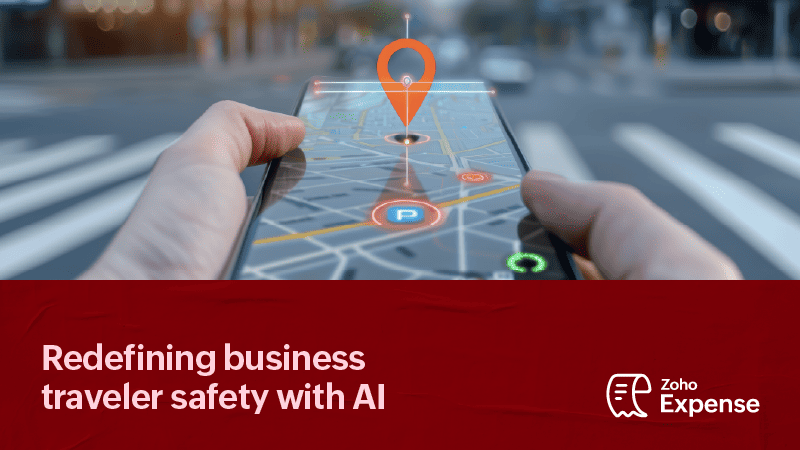- HOME
- Business travel
- Redefining traveler safety with AI-driven duty-of-care technology
Redefining traveler safety with AI-driven duty-of-care technology
Traveler safety has always been the hardest to tackle in the corporate travel sector. Most employees struggle to navigate through a new country or city while trying to build greater opportunities for the companies they work for. Recently, with the introduction of artificial intelligence (AI) and its expansion to almost every aspect of day-to-day living, corporate traveler safety is experiencing technological advancements like never before.
A recent report from Amadeus shows that 46% of senior technology leaders consider generative AI (GenAI) a "top priority" for their organizations. This shows that AI is here to play the long game, and any business will have to acclimate to it sooner or later. Through this article, you'll see how AI-driven duty-of-care technology is redefining business traveler safety. You can also analyze how to choose a stand-alone travel management platform to take better care of your employees on the move.

Impact of artificial intelligence on corporate travel
From smartphones to smart homes and sophisticated corporate offices, AI is present everywhere, and just like other business sectors, corporate travel is being transformed by AI. It has revamped the traditional concept of business travel from itinerary planning to bookings, expense management, and reimbursements by introducing improved personalization, cognitive memory, historical data analysis, and intuitive predictions.
The recent research report from Amadeus also states that 51% of technology leaders think GenAI already has a "significant presence" in the travel industry in their country. The following are a few roles that AI plays in revolutionizing corporate travel:
Transforming corporate travel into a more personalized experience with machine learning and GenAI.
Reducing cost and increasing savings by making accurate travel bookings.
Improving traveler safety and enhancing duty-of-care technology using predictive AI.
Promoting sustainable travel through AI-driven features like carbon footprint tracking, eco-friendly route optimizations, and more.
Help making informed decisions by providing advanced AI-driven data analysis reports and insightful dashboards.
Importance of duty-of-care in today's geopolitical dynamics
Traveling for business post-pandemic is a great concern, yet essential for every business to thrive and expand. Geopolitical tensions, viral outbreaks, political disputes, increasing cyber crimes, and climate changes are all making it harder for employees to travel safely. Understanding past incidents and predicting any threat in advance could help travelers be cautious. This is where the introduction of AI in expanding the boundaries of traveler safety came into light.
After the COVID-19 outbreak, the corporate travel sector showed an astonishing bounce back from $661 billion in 2020 to $1.36 trillion in 2023 . One major factor influencing this tremendous resilience was the introduction of AI driven duty-of-care technology. This took traveler safety to a new level.
AI-driven duty-of-care technology for traveler safety
The future of traveler safety is entirely dependent on AI-driven duty-of-care technology. According to McKinsey’s 2023 report, The State of AI in 2023: Generative AI’s Breakout Year, more than 79% have been exposed to GenAI in one way or the other, and more than 22% have been using it in their professional roles. Even after having a lot of doubts, unanswered questions, and accuracy challenges on AI, this technology has shown a rapid improvement in adoption rates.
The following points highlight the scope of AI in revolutionizing the concept of duty-of-care in the corporate travel sector.
Location analysis and safety screening: AI can precisely incorporate a variety of data sources like social media, news reports, memes, online articles, and more to evaluate accommodations instead of depending on online reviews.
Advanced health insights: AI can evaluate the destination using the traveler's past medical records and alert them if any allergy trigger is likely to happen due to any seasonal changes, climatic conditions, or other environmental factors.
Climatic evaluation and threat alerts: By analyzing past historical data, AI can predict the chances of any natural disaster like flood or cyclone at the destination and alert the traveler to be prepared.
Offline access to critical information: AI-powered duty-of-care systems should provide travelers with offline access to details and locations of any emergency services like hospitals, police stations, and evacuation centers.
Sleep analysis and rest management: AI can analyze the duration of travel and curate an itinerary that is less tiring to help the traveler improve their sleep cycle and control fatigue. This can reduce travel stress and prevent jet lag, allowing the traveler to be more productive and energetic.
Vaccination alerts and tracking: AI-powered traveler safety applications should be able to notify the traveler about vaccination requirements for the destination, along with any specific outbreaks that require precautionary vaccines.
Key points to remember while choosing an AI powered duty-of-care platform
It would take a powerful AI-driven travel management platform to offer best-in-class duty-of-care features. While all of these features are game-changing factors, keep in mind that AI-powered technology, to be excessively accurate, depends on highly data-intensive configurations. This can be quite challenging and could often result in bypassing a country's regional privacy policies. Hence, it is essential to keep the following factors in mind:
Make sure the company offering the software is well reputed and compliant with privacy protection regulations such as GDPR, transport layer security, SOC, PCI, and more.
Prefer travel management platforms that offer real-time employee tracking as it improves the accuracy of action.
Prioritize traveler safety by choosing a platform that offers 24/7 support.
Verify easy integration options with existing IT ecosystems and prioritize scalability with organizational growth.
Choose software with a user-friendly interface and contextual navigation system for hassle-free employee onboarding.
Check these points as you evaluate AI-driven travel management software so you can dive deeper into the world of AI and welcome its advancements to improve corporate traveler safety and security.
 Anu Sathian
Anu SathianAnu Sathian is a passionate FinTech content writer and a seasoned marketing professional with over 5 years of experience and a robust background spanning diverse industries, including FMCG, SaaS, IT Services, Higher Education, and Corporate and Commercial Travel. As a contributing expert at Zoho Expense Academy, Anu leverages this broad understanding to deliver insights that help businesses optimize their financial operations, with a particular emphasis on business travel, expense management, and corporate spend management. With a deep understanding of the evolving landscape of business spend and a knack for simplifying complex financial topics, Anu's content aims to empower businesses with actionable strategies.